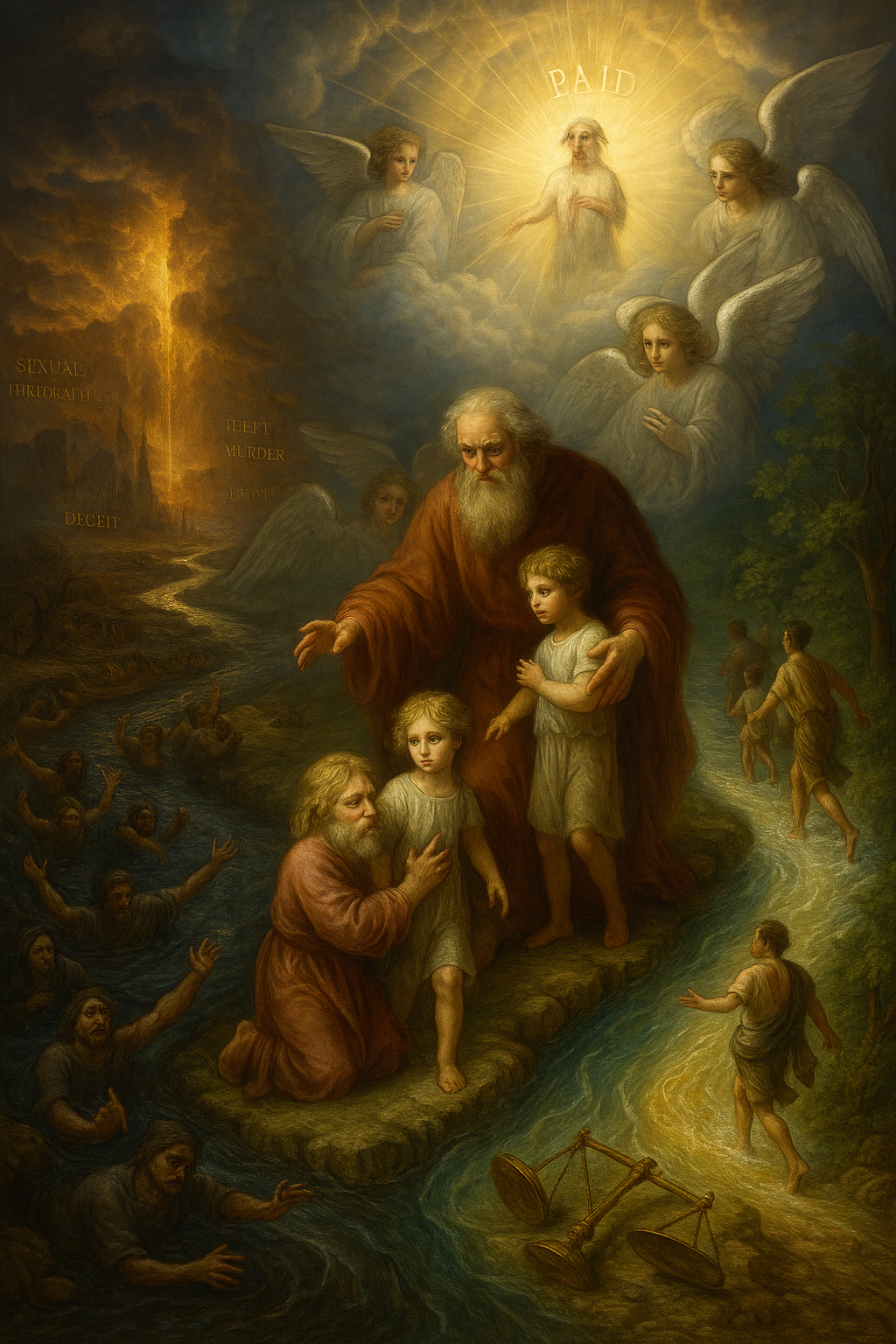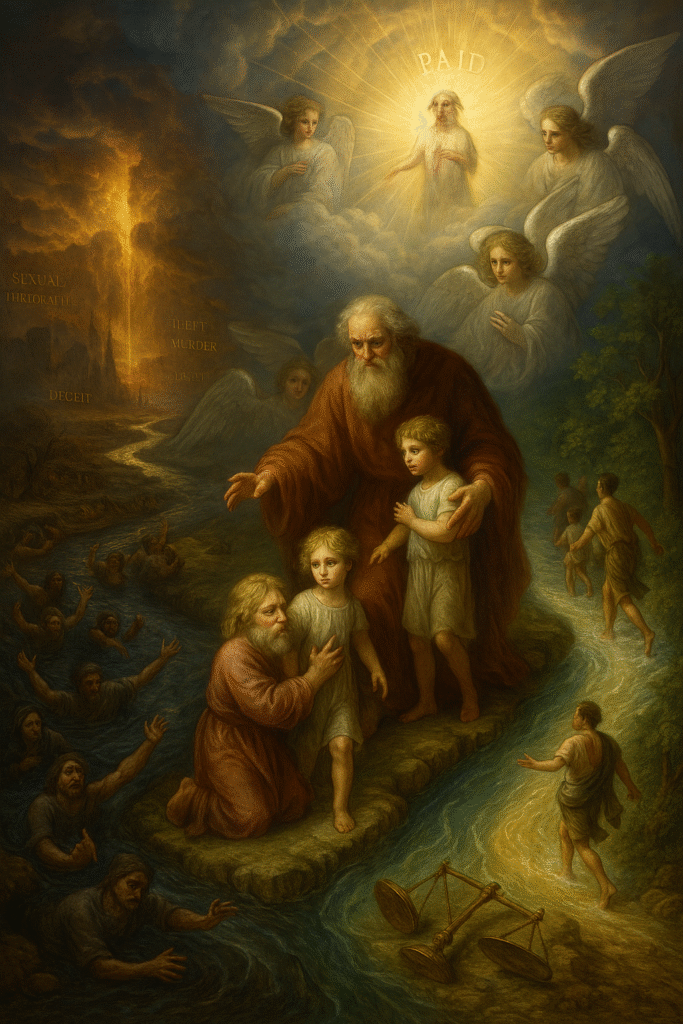Physical Address
304 North Cardinal St.
Dorchester Center, MA 02124
Physical Address
304 North Cardinal St.
Dorchester Center, MA 02124
With Michael Walker
With Michael Walker

A message to the New Creation…

From the very beginning of creation, man has wrestled with the question of sin, death, and judgment. The grief of life is that children, preteens, and even teenagers sometimes die before their time, leaving behind unanswered cries and aching questions in the hearts of those who remain. The Scriptures do not leave us without witness on this matter, and yet the way religion has shaped our understanding often distorts the very character of God. It has painted Him as punisher, as the cosmic executioner, when in reality He is the healer, the exonerator, the one who separates infection from cure. To ask what happens to children is not only to ask about their destiny, but to ask about the true nature of judgment itself. The answer does not lie in cold doctrine or the harshness of legalistic religion, but in the living revelation of what sin is, what death is, what judgment means, and how Yahweh secures His justice through the blood of Yehoshua.
Sin is not first a moral misstep. It is not simply the sum of bad deeds weighed against the good. It is a congenital infection, an involuntary inheritance received through Adam’s bloodline. It is a terminal condition, coursing through the veins of every human being born of flesh. Paul’s words are exact: “The wages of sin is death.” He does not say the punishment of God is death. He says the wage. The natural outflow. The paycheck that sin itself issues. It is employer–employee language. Sin pays death to those enslaved under it. This means that Yahweh does not need to govern sin with a hammer of punishment; sin carries its own judgment in its very nature. Like poison in the bloodstream, it does not need a tribunal to declare its outcome—it kills by itself. The collapse is intrinsic. Thus death is not God’s punishment; it is sin’s reaction. When the infection matures, the body fails. When desire is conceived, it gives birth to sin, and sin, when it is full grown, brings forth death.
This changes everything. Because when children die, for whatever reason, they die not because God has punished them, but because they share in Adam’s infection. Mortality. They have not willfully chosen rebellion. They do not even yet discern between good and evil. They cannot see that they are sick, much less reach for the cure. And so while sin executes the body’s collapse, the Father exonerates their souls. He does not impute condemnation where there is no capacity for discernment. He does not hammer down judgment on partial free will. The ancient testimony confirms this. In Deuteronomy, Yahweh distinguishes between the parents who sinned in rebellion and the little ones who “have no knowledge of good and evil.” The parents die in the wilderness; the children inherit the promise. In Isaiah, it is written of a child who, “before he knows to refuse evil and choose good,” lives in a window of innocence. And in David’s grief, when his infant son dies, the king rises from the ground, washes, and declares with certainty, “I will go to him, but he will not return to me.” David knew his son was received, not condemned.
Yehoshua Himself seals this truth. When the disciples sought to turn children away, He rebuked them: “Let the little ones come to me, for to such belongs the kingdom of heaven.” He said that their angels always behold the face of His Father. To such belongs—not merely someday, but as a present reality—the kingdom. The Father draws them into His bosom. Sin judges them in the body by wage, but Yahweh exonerates them in the spirit by mercy. And this mercy is not cheap. It is not as if God overlooks sin. No, every sin, even inherited sin, demands a life. The infection’s wage must still be paid in blood. And this is the glory of the Lamb: a life has already been given. The blood of Yehoshua has already been poured out. The payment was not ignored, it was fulfilled, and more than fulfilled—it was overpaid. The worth of the Son exceeds the debt of Adam. Therefore God is not unjust in exonerating the innocent, for the life has been paid, the deed satisfied, the justice secured. He is both just and the justifier.
Now let us consider judgment itself. What is there to judge on the last day? Religion imagines scales, a celestial courtroom with God tallying every deed, trembling souls waiting for a gavel to fall. But the Scriptures speak differently. The Greek word krisis means separation, decision, the exposure of reality. Judgment is unveiling, not courtroom theatrics. On that day, what will be revealed is simple: whether you remained in Adam or received Yehoshua. Whether you stayed with poison or embraced the cure. Deeds will be listed, yes, but for the cured they will not be imputed. For the infected, deeds will be irrelevant, because infection itself is terminal. The only deed that matters is the bad judgment of rejecting life. That is why Yehoshua says in John 3:18 that the one who does not believe “has already been judged.” Already judged, not by God’s hammer, but by the condition of remaining in unbelief. It is the infection itself that issues the verdict. God only exposes it. Paul echoes this in Corinthians: “Do not judge before the time, but wait until the Lord comes, who will bring to light what is hidden.” Bring to light, not add punishment.
Thus we see: sin is the executor, always paying out death. Yahweh is the exonerator, drawing in children and all those without full discernment, and honoring the free will of those mature enough to know yet choosing rebellion. Yehoshua is the cure, the blood that transfuses us out of Adam’s death into His life. Free will is never mocked. God does not punish men for using it. He honors it and allows its consequences. To choose sin when one knows the difference is to agree with death. To refuse the cure is to despise the very life already purchased for you. In the end, the only judgment to judge is bad judgment—the refusal of life in the face of life offered.
This reframes wrath itself. Wrath is not Yahweh’s temper tantrum, His emotional outburst of punishment. Wrath is the collision of unhealed infection with His holy presence. Light obliterates darkness simply by being light. Fire consumes disease simply by burning pure. To stand in Yahweh’s unveiled presence without the cure is to be undone, not because He lashes out, but because holiness and infection cannot co-exist. Thus He separates. Separation, not punishment, is His action. And in that separation, justice is maintained.
Here lies the comfort for grieving parents: their child has not been condemned. Their child has not been punished. Their child, though carrying Adam’s infection and his mortality, was received under the covering of the Lamb, exonerated because they did not know they were sick, drawn into Yahweh’s bosom because He sees what they could not. This is why David could hope, why Yehoshua welcomed children, why the kingdom belongs to them. Here also lies clarity for all who hear: your deeds are not weighed on cosmic scales; your infection has already been exposed, and your only question is whether you have received the cure. And here lies warning: rejection of the cure is the true bad judgment, the decision that leaves you in sin’s wage, and sin will always pay in death.
Thus the counterfeit image of the punisher God is shattered. He is not the executioner tallying sins and hurling punishments. Sin is the judge that pays its own wage. Yahweh is the healer and exonerator. The Son is the cure. The Spirit is the transfusion. Judgment Day is not the day of punishment but the day of exposure, the day when light unveils what was hidden, and the day when separation preserves what is whole.
And in all of this, justice is never compromised. A life was given. Blood was shed. Payment was made. Not barely sufficient but infinitely abundant. The cross was not a symbolic gesture; it was the receipt of the universe, the proof that every demand was answered in full and then some. That is why the Lamb is worthy. That is why He can open the seals. That is why He can exonerate children, pardon the innocent, justify the faithful, and still condemn the willful rejectors without injustice.
So we return to the beginning: what happens to children who die? They die because of Adam’s infection and his mortality, but they are not condemned because they lacked discernment. Sin judged their body, but the Father exonerated their soul. They are received, gathered, cherished. And what happens to the rest of us? The same principle applies: the only question is cure or poison, life or death, Adam or Yehoshua. On that day, the only judgment will be the unveiling of your own judgment—the choice you made. To choose the cure is to live. To reject it is to die.
And thus the revelation flows: sin is the judge that pays death, Yehoshua is the cure that pays life, the Father is the exonerator who separates and justifies, and the Spirit is the breath that transfuses new creation. This is the gospel, not the idol of punishment but the truth of infection, cure, and separation. This is the good news for grieving hearts and the warning for careless ones. This is the river that runs from Genesis to Revelation: the wages of sin is death, but the free gift of God is eternal life in Yehoshua, the Messiah, our Lord.
Amen.